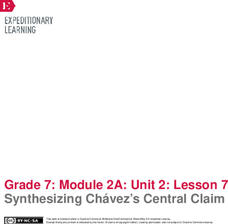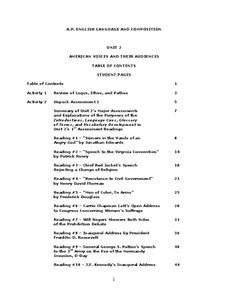PBS
Cesar Chavez: Labor Leader and Civil Rights Activist
Cesar Chavez believed so much in the cause of farmworkers that he put his money where his mouth was. Chavez quit his well-paying job to organize them into labor unions. Using a speech, photograph, and short biographical video, pupils...
National Woman's History Museum
Introduction to Activism
Activist, feminist, and labor organizer Dolores Huerta are perhaps best known for her work with Cesar Chavez to create the United Farm Workers. Class members explore primary source documents to learn more about this Medal of Freedom winner.
Core Knowledge Foundation
Civil Rights Leaders
A Student Reader focuses on Civil Rights leaders. Scholars read or listen to an informational text about Susuan B. Anthony, Mary McLeod Bethune, Eleanor Roosevelt, Jackie Robinson, Rosa Parks, Martin Luther King Jr., Cesar Chavez, and...
Core Knowledge Foundation
Civil Rights Leaders
A unit focuses on Civil Rights leaders. Scholars read or listen to an informational text about Susuan B. Anthony, Mary McLeod Bethune, Eleanor Roosevelt, Jackie Robinson, Rosa Parks, Martin Luther King Jr., Cesar Chavez, and other...
Core Knowledge Foundation
Fighting for a Cause Tell It Again!™ Read-Aloud Anthology
A read-aloud anthology highlights the essential contributions of activists Susan B. Anthony, Eleanor Roosevelt, Mary McLeod Bethune, Jackie Robinson, Rosa Parks, Martin Luther King Jr., and Cesar Chavez. Scholars listen to stories,...
EngageNY
Speech Structure: Unions as Agents of Change— Part 2
Scholars continue reading César Chávez's 1984 speech, "Address to the Commonwealth Club of California." Working with partners, they complete graphic organizers to determine a claim that Chávez makes about the UFW.
EngageNY
Speech Structure: Part 2 of the Commonwealth Club Address
Scholars continue reading and analyzing César Chávez's 1984 speech, "Address to the Commonwealth Club of California." Working with partners, they answer text-dependent questions about how governments and consumers affect working...
EngageNY
End of Unit Assessment: Analyzing the Structure of Chávez’s Wrath of Grapes Speech
César Chávez gave his 1986 "Wrath of Grapes" speech to educate consumers about pesticide use. Scholars complete an end of unit 2 assessment, applying what they learned throughout the unit to a new text. They then analyze the structure of...
EngageNY
Reading Closely and Introducing Rhetoric Toolbox: Unions as Agents of Change—Part 1
Scholars explore the question of whether labor unions are the agents of change as they continue reading César Chávez's 1984 speech, "Address to the Commonwealth Club of California." They discuss rhetoric in Chávez's speech and discover...
EngageNY
Reading Closely: Introducing Chávez’s Commonwealth Club Address and Considering the Plight of the Farmworker
How can a persuasive speech help inspire social change? Scholars read along as they listen to the first half of César Chávez's 1984 speech, "Commonwealth Club Address." Next, pupils use graphic organizers to analyze one of Chávez's...
EngageNY
Mid-Unit Assessment: How Chávez Develops His Claims in the Commonwealth Club Address
Scholars complete a mid-unit 2 assessment, analyzing how César Chávez supports his claims in his 1984 speech, "Address to the Commonwealth Club of California." Learners focus on paragraphs 18 and 19 of the speech, answering text-based...
EngageNY
Synthesizing Chávez’s Central Claim
Class members play an interactive game, matching strips of paper containing rhetorical devices with examples from César Chávez use rhetoric in his 1984 speech, "Address to the Commonwealth Club of California." Next, partners discuss...
Northshore School District
American Voices and Their Audiences
Those new to teaching an AP level language and composition prep course and seasoned veterans will find much to treasure in a unit that is designed to help young language scholars develop the skills they need to analyze the language...
College Board
2015 AP® English Language and Composition Free-Response Questions
Many schools have honor codes, but scholars do not always choose to follow them. As part of a series of free-response questions from the AP® English Language and Composition Exam, learners discuss the benefits or disadvantages of honor...
Curated OER
Who’s Got Rights? An Introduction to Human Rights and Human Rights Defenders
Students explore human rights issues. For this social justice lesson, students examine human rights as they read segments of the "Universal Declaration of Human Rights," discuss photographs with human rights implications, and play a...
CommonLit
Common Lit: Address to the Commonwealth Club of California
A learning module that begins with the speech "Address to the Commonwealth Club of California" by Cesar Chavez, accompanied by guided reading questions, assessment questions, and discussion questions. The text can be printed as a PDF or...
American Rhetoric
American Rhetoric: Cesar E. Chavez: "The Mexican American and the Church"
This is a paper that was prepared and presented by Cesar E. Chavez and presented in March 1968 at the Second Annual Mexican Conference in Sacramento, California. In it, he discusses the lack of support from the Catholic parish for the...


















